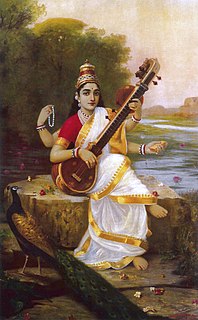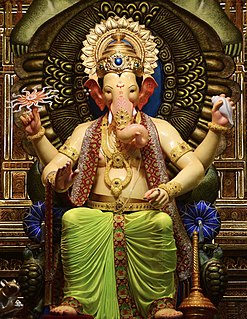Hinduism is an Indian religion and dharma, or way of life, widely practised in the Indian subcontinent and parts of Southeast Asia. Hinduism has been called the oldest religion in the world, and some practitioners and scholars refer to it as Sanātana Dharma, "the eternal tradition", or the "eternal way", beyond human history. Scholars regard Hinduism as a fusion or synthesis of various Indian cultures and traditions, with diverse roots and no founder. This "Hindu synthesis" started to develop between 500 BCE and 300 CE, after the end of the Vedic period, and flourished in the medieval period, with the decline of Buddhism in India.

Hindus are persons who regard themselves as culturally, ethnically, or religiously adhering to aspects of Hinduism. Historically, the term has also been used as a geographical, cultural, and later religious identifier for people indigenous to the Indian subcontinent.

The Hindu Kush, also known in Ancient Greek as the Caucasus Indicus or Paropamisadae, is an 800-kilometre-long (500 mi) mountain range that stretches near the Afghan-Pakistan border, from central Afghanistan to northern Pakistan. It forms the western section of the Hindu Kush Himalayan Region (HKH). It divides the valley of the Amu Darya to the north from the Indus River valley to the south.

Hindu mythology are narratives found in Hindu texts such as the Vedic literature, epics like Mahabharata and Ramayana, the Puranas, the regional literatures like Periya Puranam. Hindu mythology is also found in widely translated popular texts such as the Panchatantra and Hitopadesha, as well as Southeast Asian texts.

Parvati or Gauri is the Hindu goddess of fertility, love, beauty, marriage, children, and devotion; as well as of divine strength and power. Known by many other names, she is the gentle and nurturing aspect of the Supreme Hindu goddess Adi Parashakti and one of the central deities of the Goddess-oriented Shakta sect. She is the Mother goddess in Hinduism, and has many attributes and aspects. Each of her aspects is expressed with a different name, giving her over 100 names in regional Hindu stories of India. Along with Lakshmi and Saraswati, she forms the trinity of Hindu goddesses (Tridevi).

Durga, identified as Adi Parashakti, is a principal and popular form of Hindu Goddess. She is the warrior goddess, whose mythology centres around combating evils and demonic forces that threaten peace, prosperity and dharma of the good. She is the fierce form of the protective mother goddess, willing to unleash her anger against wrong, violence for liberation and destruction to empower creation.

Radha, also called Radhika, Radharani, and Radhe, is a Hindu goddess popular in Hinduism, especially in the Vaishnavism tradition. She was said to be the head of the milkmaids who resided in Braj Dham. She is the lover of the Supreme personality of Godhead Lord Krishna in the medieval era texts. She is a supreme goddess in her own right.

Saraswati is the Hindu goddess of knowledge, music, art, wisdom, and learning. She is a part of the trinity (Tridevi) of Saraswati, Lakshmi, and Parvati. All the three forms help the trinity of Brahma, Vishnu, and Shiva to create, maintain, and regenerate-recycle the Universe, respectively.

Ushas is a Vedic goddess of dawn in Hinduism. She repeatedly appears in the Rigvedic hymns, states David Kinsley, where she is "consistently identified with dawn, revealing herself with the daily coming of light to the world, driving away oppressive darkness, chasing away evil demons, rousing all life, setting all things in motion, sending everyone off to do their duties". She is the life of all living creatures, the impeller of action and breath, the foe of chaos and confusion, the auspicious arouser of cosmic and moral order called the Ṛta in Hinduism.

Ganesh Chaturthi, also known as Vinayaka Chaturthi or Vinayaka Chavithi is a Hindu festival celebrating the birth of Ganesha. It falls in the months of August or September of the Gregorian calendar. The festival is marked with the installation of Ganesha clay idols privately in homes, or publicly on elaborate pandals. Observations include chanting of Vedic hymns and Hindu texts such as, prayers and vrata (fasting). Offerings and prasadam from the daily prayers, that is distributed from the pandal to the community, include sweets such as modaka as it is believed to be a favorite of Lord Ganesh. The festival ends on the tenth day after start,but we end it by one and a half day where the idol is carried in a public procession with music and group chanting, then immersed in a nearby body of water such as a river or sea. In Mumbai alone, around 150,000 statues are immersed annually. thereafter the clay idol dissolves and Ganesha is believed to return to Mount Kailash to Parvati and Shiva. The festival celebrates Lord Ganesha as the God of New Beginnings and the Remover of Obstacles as well as the god of wisdom and intelligence and is observed throughout India, especially in the states such as Maharashtra, Madhya Pradesh, Karnataka, Goa, Telangana, Gujarat and Chhattisgarh, and is usually celebrated privately at home in states such as Tamil Nadu, and Andhra Pradesh. Ganesh Chaturthi is also observed in Nepal and by the Hindu diaspora elsewhere such as in Australia, Canada, Malaysia, Trinidad and Tobago, Guyana, Suriname, other parts of the Caribbean, Fiji, Mauritius, South Africa, United States, and in Europe.

Hinduism is a minority religion in the United States. The vast majority of American Hindus are immigrants from South Asia, Indonesia, the Caribbean, Oceania, Africa, and Mauritius and other countries and their descendants. Additionally, the United States has a number of converts to Hinduism. There are also about 900 ethnic Cham people of Vietnam, living in America, 55% of whom are Hindus. They are one of the few remaining non-Indic Hindus in the World.

The Aghori are a small group of ascetic Shiva sadhus. They engage in post-mortem rituals. They often dwell in charnel grounds, smear cremation ashes on their bodies and use bones from human corpses for crafting kapalas and jewelry.
Anti-Hindu sentiment, also known as Hinduphobia or Anti-Hinduism, is a negative perception, sentiment or actions against the practice and practitioners of Hinduism.
Tyagi is a surname which historically belonged to the Brahmin caste. As of a 1990 report by the Backward Classes Commission, Government of Haryana, they were mostly engaged in farming.
Rohit, pronounced [ˈroːɦɪt̪]) is a given name, typically male, used among Indian people. It is also used in some parts of Nepal. It is mostly used by Jains, Hindus, and Sikhs.

Rama or Ram, also known as Ramachandra, is a major deity of Hinduism. He is the seventh avatar of the god Vishnu, one of his most popular incarnations along with Krishna and Gautama Buddha. In Rama-centric traditions of Hinduism, he is considered the Supreme Being.

Devī is the Sanskrit word for "goddess"; the masculine form is Deva. Devi – the feminine form, and Deva – the masculine form, mean "heavenly, divine, anything of excellence", and are also gender specific terms for a deity in Hinduism.
Jeffery D. Long is Professor of Religion and Asian Studies at Elizabethtown College, in Pennsylvania, USA. He is associated with the Vedanta Society, DĀNAM and the Hindu American Foundation. A major theme of Long's work is religious pluralism, a topic he approaches from a perspective informed by the process philosophy of Alfred North Whitehead and which he refers to as a "Hindu process theology."
Navaratri, also spelled Navratri or Navarathri, is a nine nights Hindu festival, celebrated in the Tamil month of Purattasi every year. It is celebrated differently in various parts of the Indian subcontinent. There are two seasonal Navaratri in a year. This festival in this month is called Sharada Navaratri that is the most celebrated for Goddess Durga.

The Matsya Purana is one of the eighteen major Puranas (Mahapurana), and among the oldest and better preserved in the Puranic genre of Sanskrit literature in Hinduism. The text is a Vaishnavism text named after the half-human and half-fish avatar of Vishnu. However, the text has been called by the 19th-century Sanskrit scholar Horace Hayman Wilson, "although a Shaivism (Shiva-related) work, it is not exclusively so"; the text has also been referred to one that simultaneously praises various Hindu gods and goddesses.
















